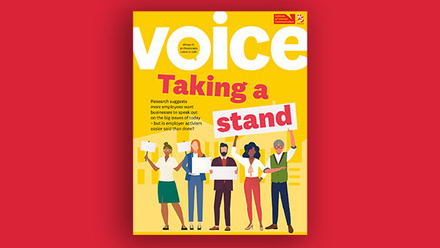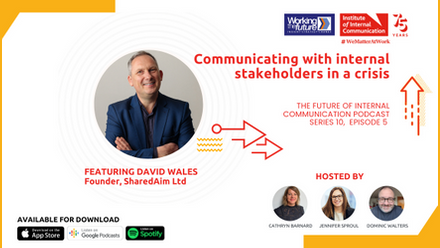Almost 500 internal communication professionals completed IoIC’s Covid-19 survey between 28 March and 10 April.
Overwhelmingly, these practitioners say their response to the crisis is likely to benefit their long-term credibility, with 90% believing the situation will have a “very positive” (32%) or “positive” (58%) impact on the IC profession.
Increase in trust
Internal communicators say their comms around Covid-19 is having a positive influence on employees’ trust in communication (83%) and leaders (76%).
83%
Percentage of survey respondents who are seeing a positive impact on trust in communication.
The expected impact on trust in line managers is less stark, with only 53% believing it will improve (42% were neutral). Though managers are, by far, the primary source for IC to gauge the views and concerns of employees, with 47% relying on them; second is internal social media, used as a primary source by 20% of IC practitioners.
Greater visibility for IC
The situation is also positively affecting IC practitioners’ roles. While the added workload during the crisis is the main impact (71% of practitioners registered this as a change), two-thirds say leaders are looking to IC more for guidance, half note improved engagement with colleagues, 44% say they have learnings they can take into future roles, and 43% have developed crisis management skills.
66%
Internal communicators who say leaders are looking to them for more guidance as a result of the crisis.
Also positively, the three options with least impact are IC being sidelined in key discussions, budget reductions on IC projects, and people cuts.
“So many non-IC people have become aware of the importance of our role,” said one respondent. “Some didn't even know what we did four weeks ago. So it is critical that we make sure everyone knows who kept the news flowing, the troops informed and the morale buoyant.”
Top challenges: cutting through the noise
Almost one-third of respondents say “cutting through communication noise” is their biggest challenge in communicating Covid-19 – twice as many who cite “consistency of message”, which came out as the second biggest challenge.
Several respondents noted a key challenge was the speed that information is changing.
“Decisions and messaging we agree on one day are being turned on their head within 24 hours,” said one. “We’re in the travel industry and the situation is continually evolving.”
Another said it has been critical to get the balance right – “not overwhelming with too much info, which can cause stress, but making sure the seriousness of the situation is clear”.
Impact on mental health
For many respondents, the challenges and personal concerns stretch beyond communication. A quarter of respondents are concerned about lost income and 14% about the possible closure of their organisations.
Many referenced the impact on mental wellbeing, caused largely by the increased workload to individuals and on the whole team – generally, and as a result of the loss of colleagues – and working from home with a young family. There are other factors causing anxieties, including long-term isolation, concern for their own health or that of family members, and delays to business-as-usual projects as crisis comms takes over.
One respondent summed up the stress as “putting out a ridiculous amount of comms while working at home with two small kids” and others raised concerns about sustaining the high volume of work into the foreseeable future.
Core messages
By some way, the three main messages to employees are:
- remote working and business continuity
- public health information
- driving positivity in uncertain times.
Personal health is believed to be employees’ greatest concern.
Fewer than a quarter of communicators (22%) listed business as usual comms as one of their three messaging priorities during the crisis.
Use and effectiveness of channels: email and video calls
Unsurprisingly, email is the most used channel (99% of respondents), with 46% saying it is “very effective” and another 36% saying it is “effective”.
While a slightly smaller proportion have been using video and/or conference calls, 92% of those who are using it say it is either “very effective” (64%) or “effective” (28%).
88%
Percentage of respondents using video and/or conference calls – of which 92% said the channel was effective.
Around a quarter of communicators have not been using social media platforms to talk about the crisis, and only 62% of those who are say it is either “effective” or “very effective”.
At the time of our survey, 56% of respondents were still communicating daily, with a further handful communicating hourly. Additionally, other respondents indicated they had previously been sharing information daily, but this had become less frequent.
Internal and external comms also appear to be working closely together, with almost two-thirds (64%) saying the messaging was very well aligned, and only 2% saying it was not at all.
Sharing best practice
Respondents indicate they have been getting value from webinars and sites sharing tips and guidance, and are keen to hear more from peers about what is working well in their organisations.
“We should capture the great practice happening now,” said one respondent. “This is hopefully a once in a generation event, and we should pass this experience onto the next generation of communicators.”
Some are looking ahead to life and work after the pandemic.
“I'm taking great comfort in the fact everyone is in the same boat – just maybe navigating choppy waters at different times. Planning for a life after this is key, because it will pass.”
“I'm really interested to know how IC professionals expect culture and engagement to be different post-Covid.”
More than half of the 483 respondents were from the private sector – covering a range of sectors, including finance, construction, healthcare, energy/utilities, technology and travel. One-fifth were from the public sector, eight per cent were from charities and eight per cent were from agencies.
Support from IoIC
In the survey, we asked what more IoIC could do to support internal communicators.
Mainly, respondents asked for more resources and to read more best practice – whether through webinars, case studies or articles.
There is also a great interest to increase network opportunities, such as virtual coffee chats, so people can share opinions and experiences.
In response to the crisis and to the feedback in our survey, IoIC has already taken action.
- IoIC is working with the Government Communication Service as a member of its communication industry-wide advisory panel. This will drive support to IC practitioners, as we share insight and contribute to the development of a job portal, where those whose roles have been impacted by the crisis can register
- IoIC is offering free six-month membership to individuals who have lost their jobs as a result of the Covid-19 crisis.
- We are starting to share best practice and advice through webinars, and we are developing case studies
- We have launched a Coronavirus Advice Centre online, where we are collating useful IoIC resources and curated content.
- We have launched a LinkedIn Group specifically for IC practitioners to share their concerns, challenges, advice and best practice related to the Covid-19 crisis.
- We are planning additional ways to network, so practitioners can share experiences and ideas – while social distancing! We will be hosting our first virtual huddle next week.
Almost 500 internal communication professionals completed IoIC’s Covid-19 survey between 28 March and 10 April.
Overwhelmingly, these practitioners say their response to the crisis is likely to benefit their long-term credibility, with 90% believing the situation will have a “very positive” (32%) or “positive” (58%) impact on the IC profession.






